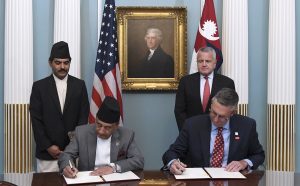Nepal’s public scene is boiling up with debate over the controversial Millennium Challenge Corporation (MCC) pact, which many see as infringing Nepali sovereignty. The controversy ignited as some Maoist leaders in closed-door meetings claimed that the MCC is the real reason for the ouster of former speaker of the house Krishna Bahadur Mahara. Mahara, who was just acquitted of charges of attempted rape, had not given space for the ratification of the MCC in the legislature.
The agreement indeed holds many asymmetric qualities. According to section 7.1, the MCC agreement “will prevail over the domestic laws of Nepal,” while section 5.1 (iii) mentions that MCC funding cannot be used to violate U.S. law “or United States Government policy.” But the real controversy is not about the agreement’s asymmetric nature, but the Nepali phobia that the U.S. aid is part of the Indo-Pacific Strategy and may be used for military purposes.
There have been some fake viral stories about the United States preparing its army to enter Nepal the day MCC is ratified by the parliament. The United States may use dominating language, but Washington generally openly projects its desired plans. As an example of U.S. transparency, the annual Foreign Military Training Report not only mentions the location of all U.S. military training in Nepal but also the course title, the student unit, U.S. unit, total cost, start date, and end date.
The MCC agreement, in section 2.7, clearly mentions that the funding cannot be used for the military but some readers look at section 6.8, which provides immunity for MCC staff in “all courts and tribunals of Nepal,” and fear this could be used for military purposes. There is no doubt that diplomats should continue to hold diplomatic immunity, but should immunity be granted for other activities? Isn’t this an infringement of the sovereignty of Nepal?
The United States is not generally circumspect. It has made a clear statement that the MCC is part of the Indo-Pacific Strategy. Many in Nepal thus perceive the MCC agreement as a violation of the Constitution of Nepal’s Article 51 (m), which commits the country to a strong non-alignment principle.
In particular, there are fears that the MCC agreement will drag Nepal into the U.S. competition with China. The United States’ June 1, 2019, Indo-Pacific Strategy Report very clearly mentions that China is a revisionist power and a threat, while Nepal maintains friendly relations with China. The Nepali mentality was deeply shattered with the unofficial Indian blockade of 2015. Kathmandu realizes the importance of roads and railways connecting to China and thus holds the Belt and Road Initiative in a positive light.
The United States was the second country recognized by Nepal, after the United Kingdom and even before Nepal recognized its neighbors, India and China. Since then, the two countries have held a very friendly attitude toward one another. The United States assigned special importance to Nepal after the emergence of the People’s Republic of China.
A key strategic location of Nepal, the Mustang district, was used by the CIA to support the Khampa rebellion in Tibet. This fact could not have been kept hidden from the eyes of the then-government of Nepal, as the rebel group had used their military might to rape, loot, and vandalize Nepali property. Nepal finally disarmed the Khampa rebellion after pressure from China in 1974; prior to that, the rebels had been present in Nepal in some form since the early 1960s.
It is very clear that in return for its assistance, the United States made every effort to keep the Nepali monarchy happy. Washington extended a grand welcome to the King of Nepal when he visited the United States in 1967. Tellingly, this was not the case in 1983 when another king of Nepal went to the United States — perhaps because Nepal no longer provided a base for the Khampa rebellion.
During the same period, the United States was a benevolent donor for the Nepali army as it provided $1.8 million in military aid in 1965-66. During this time, Nepal enjoyed military equipment that was not even available in India.
Nepal, being a major contributor to United Nations Peacekeeping missions, continues to maintain strong ties with the United States through participation in the Enhanced International Peace Keeping Capabilities (EPIC) program.
It is a false rumor that the United States plans to misdirect funds and resources from the MCC to pursue its security interests in Nepal. The United States is not a shy country and tends to openly display its militaristic agenda and ambitions. But it is also true that the MCC acts as an unequal treaty that puts American law above Nepali law and even forbids Nepali law to prevail when a punishable offense is conducted under the aegis of the MCC.
There is no doubt the United States under Donald Trump does not value diplomatic etiquette. The MCC has been presented more like a regular business deal, which becomes unacceptable for the Nepali people. Nepal after the 2015 unofficial blockade by India does not want to distance itself from China. The United States seems not to understand the complexities affecting Nepali public opinion, which may turn the Nepali people against the United States.
Kripendra Amatya is a social-political activist in Nepal who is active in the movement against the MCC. He is a graduate in International Relations from Jilin University, China.

































